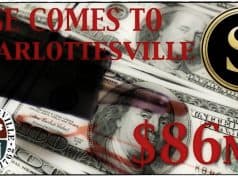
On September 3, 1783, the Treaty of Paris officially ended the American Revolutionary War. Against all odds, the makeshift American militia, having endured 8 years of fighting, defeated the world’s strongest military to bring independence to the American people at last. Despite this great achievement, we observe Independence Day not on the 3rd of September, but instead on the 4th of July to celebrate the day in 1776 when the Continental Congress adopted the Declaration of Independence.
The Declaration of Independence is more than a statement of political autonomy. It plainly identifies a number of grievances against the King of Great Britain. But above all, it sets forth the fundamental principles that form the basis of American political thought. It acknowledges the inherent supremacy of “the Laws of Nature and of Nature’s God.” It proclaims that governments are established by the consent of the people to secure their natural rights to “life, liberty, and the pursuit of happiness.” And it asserts that the people are not bound to sustain a government that infringes upon their rights, for it says that “whenever any form of government becomes destructive to these ends, it is the right of the people to alter or to abolish it, and to institute new government” committed to these ideals.
We celebrate Independence Day on July 4 because it marks the day when our nation formally dedicated itself to the preservation of our inalienable rights. Although the American people had endured the infringement of their rights for many years under British rule, on July 4, 1776, they made it known to all that they would suffer injustice no more.
Of course, many of the injustices listed in the Declaration of Independence were not so unbearable. Despite all the outrage over colonial taxation, for example, Americans were paying a lot less in taxes than their British counterparts in those days. But the American people revolted as a matter of principle—against the idea that an unrepresentative government could tax them at all—not because they regarded government as excessively oppressive.
Moreover, our founders feared that the British government’s illegitimate exercise of power, left unopposed, would grow stronger in time due to the apparent authority bestowed on precedential action. Thomas Paine wrote in Common Sense that “a long habit of not thinking a thing wrong, gives it a superficial appearance of being right, and raises at first a formidable outcry in defense of custom.” The Declaration of Independence also pointed out “that mankind are more disposed to suffer, while evils are sufferable, than to right themselves by abolishing the forms to which they are accustomed.” And James Madison observed, “Since the general civilization of mankind, I believe there are more instances of the abridgment of the freedom of the people, by the gradual and silent encroachments of those in power, than by violent and sudden usurpations[.]” Our founders dreaded the thought that government’s slow advance against individual liberty in America might continue unchallenged, strengthening Britain’s hold on power and inviting further abuse.
To secure their liberty, the American people set out to permanently end the steady growth of British control over the colonies. But even after achieving this objective through victory in war, our founders recognized that independence did not guarantee lasting liberty. Given the tendency of every government to expand its influence, they advised the people to watch out for any increase in governmental power in America and, in particular, to oppose all illegitimate acts justified by precedent. Thomas Paine wrote in Rights of Man, “Government by precedent, without any regard to the principle of the precedent, is one of the vilest systems that can be set up. In numerous instances, the precedent ought to operate as a warning and not as an example”—it must “be shunned instead of imitated.” James Madison similarly instructed:
[I]t is proper to take alarm at the first experiment on our liberties. We hold this prudent jealousy to be the first duty of citizens and one of the noblest characteristics of the late revolution. The freemen of America did not wait until usurped power had strengthened itself by exercise, and entangled the question in precedents. They saw all the consequences in the principle, and they avoided the consequences by denying the principle. We revere this lesson too much, soon to forget it.
Years later, Madison again urged the American people to guard against the expanse of government by invoking the principles underlying the revolution. He wrote:
The people of the U.S. owe their independence & their liberty, to the wisdom of descrying in the minute tax of 3 pence on tea, the magnitude of the evil comprised in the precedent. Let them exert the same wisdom, in watching against every evil lurking under plausible disguises, and growing up from small beginnings.
When we look at the broad scope of federal power today, it is clear that we have failed to curb the growth of our government. We’ve let federal power progressively advance beyond all limits in the Constitution, in contravention of the principles upon which our nation was formed. Government no longer preserves our inalienable rights to life, liberty, and property; in many ways, it controls them. For example, our president wields the power to kill Americans without due process of law. We are subjected to invasive searches anytime we travel. We are forced to abide by thousands of regulations crafted by unelected bureaucrats. Our property can be redistributed to the liking of those in office. And the list of arbitrary, oppressive powers goes on.
Indeed, it is tempting for us to look past these abuses and deny that despotism has come to America. We may even convince ourselves that our elective control over our representatives makes us a party to the policy choices thrust upon us—that we have nothing to complain about since our agents in government are supposedly executing our will. But our voting power amounts to nothing when government’s power is absolute. Thomas Paine explained, “It is not because a part of the government is elective, that makes it less a despotism, if the persons so elected possess afterwards, as a parliament, unlimited powers. Election in this case becomes separated from representation, and the candidates are candidates for despotism.”
The domineering government we have today was never the design of our founders—in the words of Thomas Jefferson and James Madison, “An elective despotism was not the government we fought for.” But the government we have today needs not be the government we keep. By the principles of our founding, we have the power to change our government and secure our inalienable rights. Perhaps one day, we will act on these ideals to make Independence Day meaningful once again.








